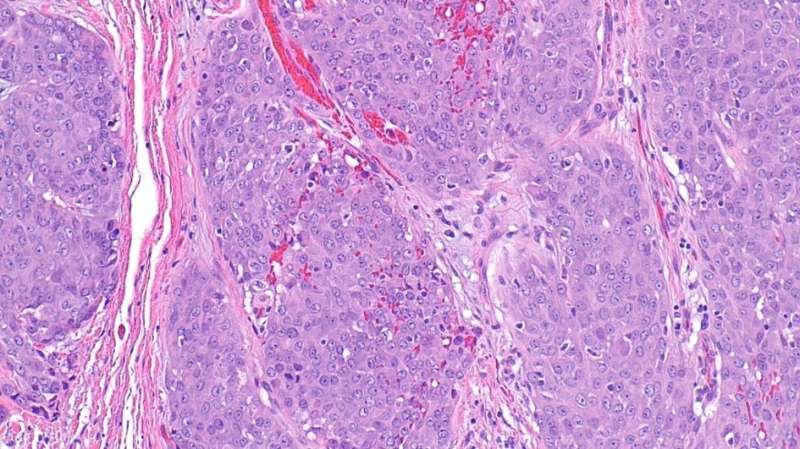
A new genetically engineered virus has delivered a one-two punch against advanced cancers in initial findings from a phase I trial.
Researchers found that RP2—a modified version of the herpes simplex virus—showed signs of effectiveness in a quarter of patients with a range of advanced cancers.
Patients on the trial had cancers including skin, esophageal and head and neck cancer and had exhausted other treatments, including by failing to respond to checkpoint inhibitor immunotherapy.
The early findings—presented at the 2022 European Society for Medical Oncology Congress (ESMO)—suggest cancer-killing viruses could potentially offer hope to some patients where other forms of immunotherapy have not worked.
Testing the safety and dosage of RP2
A team at The Institute of Cancer Research, London, and The Royal Marsden NHS Foundation Trust, assessed the cancer-killing virus on its own in nine patients and in combination with the immunotherapy nivolumab in an initial 30 patients in the ongoing phase I trial.
The early-stage study, sponsored by the drug’s manufacturer Replimune, is testing the safety and dosage of RP2, as well as evaluating its ability to shrink tumors.
The genetically engineered RP2 virus, which is injected directly into the tumors, is designed to have a dual action against tumors. It multiplies inside cancer cells to burst them from within, and it also blocks a protein known as CTLA-4—releasing the brakes on the immune system and increasing its ability to kill cancer cells.
RP2 has also been modified to produce molecules called GM-CSF and GALV-GP-R, which give the virus additional capabilities to spark the immune system into action against cancer.
Ten patients benefited from RP2
Three out of nine patients treated with RP2 on its own benefited from the treatment and saw their tumors shrink. One patient with salivary gland cancer saw his tumor disappear completely and remains free of cancer 15 months after starting treatment.
The other two patients in this group had esophageal cancer and uveal melanoma—a rare type of eye cancer—that had spread to the liver. They saw their cancers shrink and were still responding 18 and 15 months after starting treatment, respectively—meaning their cancer had not progressed.
Seven out of 30 patients who received both RP2 and the immunotherapy nivolumab also benefited from treatment.
In this group, four out of nine patients with melanoma skin cancer, two out of eight patients with the eye cancer uveal melanoma, and one out of three patients with head and neck cancer saw their cancer’s growth halt or shrink.
Of the seven patients receiving the combination who saw a benefit, six remained progression-free at 14 months.
All patients involved in the trial had very advanced cancers which had failed to respond to, or were not eligible for, standard of care options.
Switching on the anti-cancer immune response
Researchers looked at patient biopsies before and after RP2 injections and found positive changes in the tumor’s “immune microenvironment”—the area immediately around the tumor. Injections led to more immune cells in the area, including CD8+ T-cells, and “switched on” genes linked to the “anti-cancer” immune response.
Researchers found that most side effects of RP2 were mild—some of the most common were fever, chills, and fatigue. None of the side effects were serious enough to require medical intervention.
Next, researchers hope to continue exploring the potential of RP2 in a larger number of patients.
RP2 delivers a ‘one-two punch against tumors’
Study leader Professor Kevin Harrington, Professor of Biological Cancer Therapies at The Institute of Cancer Research, London, and Consultant Oncologist at The Royal Marsden NHS Foundation Trust, said, “Our study shows that a genetically engineered, cancer-killing virus can deliver a one-two punch against tumors—directly destroying cancer cells from within while also calling in the immune system against them.
“It is rare to see such good response rates in early-stage clinical trials, as their primary aim is to test treatment safety and they involve patients with very advanced cancers for whom current treatments have stopped working.
“Our initial trial findings suggest that a genetically engineered form of the herpes virus could potentially become a new treatment option for some patients with advanced cancers—including those who haven’t responded to other forms of immunotherapy. I am keen to see if we continue to see benefits as we treat increased numbers of patients.”
Taking advantage of viruses
Professor Kristian Helin, Chief Executive of The Institute of Cancer Research, London, said, “Viruses are one of humanity’s oldest enemies, as we have all seen over the pandemic. But our new research suggests we can exploit some of the features that make them challenging adversaries to infect and kill cancer cells. It’s a small study but the initial findings are promising. I very much hope that as this research expands we see patients continue to benefit.”
‘My final lifeline’
Krzysztof Wojkowski, 39, a builder from West London, was diagnosed with Mucoepidermoid carcinoma, a type of salivary gland cancer, in May 2017. After multiple surgeries, he was told that there were no treatment options left, before being given the opportunity to join the RP2 trial at The Royal Marsden in 2020.
Source: Read Full Article
